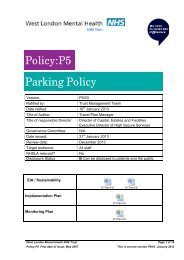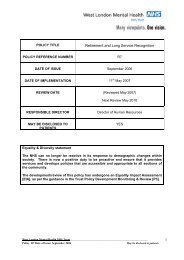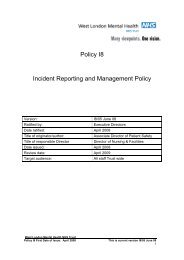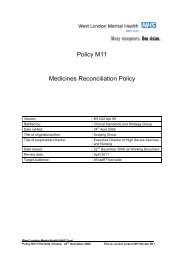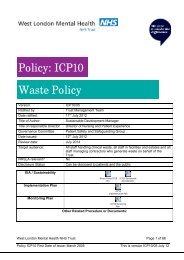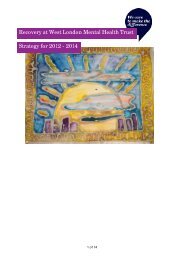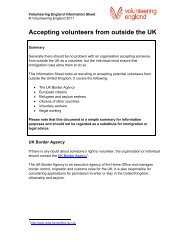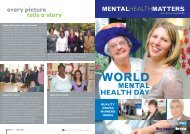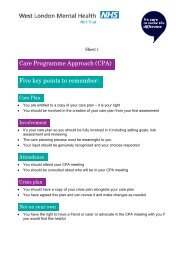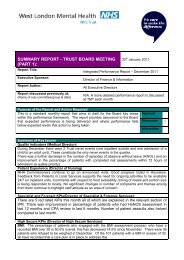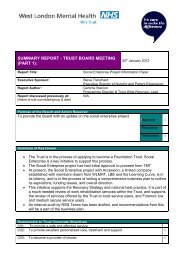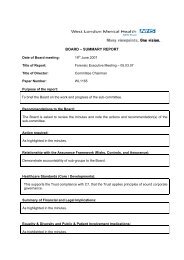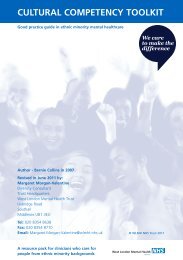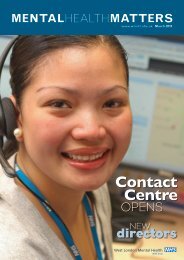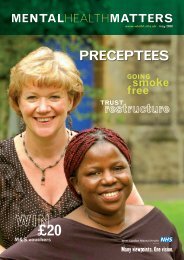MHM March 2006 - West London Mental Health NHS Trust
MHM March 2006 - West London Mental Health NHS Trust
MHM March 2006 - West London Mental Health NHS Trust
You also want an ePaper? Increase the reach of your titles
YUMPU automatically turns print PDFs into web optimized ePapers that Google loves.
mental health matters<br />
<strong>March</strong> <strong>2006</strong> Issue 21<br />
the newsletter from <strong>West</strong> <strong>London</strong> <strong>Mental</strong> <strong>Health</strong><br />
<strong>NHS</strong> <strong>Trust</strong><br />
trustwide<br />
news<br />
foundation<br />
trust<br />
going<br />
smoke<br />
free?<br />
my working life<br />
Full story on page 13
in brief...<br />
a full house<br />
The most recent meeting of the trust’s<br />
service user involvement forum was again<br />
well attended providing further evidence of<br />
the value and importance of this type of<br />
communication.<br />
This bi-monthly forum gives service users<br />
the opportunity to bring issues affecting<br />
them to the attention of the trust’s<br />
management. The meetings are chaired by<br />
chief executive, Simon Crawford with user<br />
representation from each service. The<br />
messages from service users are getting<br />
right to the top of the organisation and the<br />
minutes are shared with managers and<br />
clinicians across the trust.<br />
Patrick Nyarumbu<br />
who co-ordinates<br />
user representation<br />
at the forum says,<br />
“It is good news for<br />
those using the<br />
trust’s services that<br />
the forums have<br />
proven so successful.<br />
At the last meeting Patrick Nyarumbu<br />
there was discussion<br />
on changes to benefits which will affect<br />
many patients and the setting up of a<br />
smoking review group. It is crucial for<br />
service users and their carers and for the<br />
development of the trust and its services<br />
that information sharing of this kind<br />
continues to thrive as it has been through<br />
the user forum meetings.”<br />
opening up<br />
to learning<br />
In January and February the Broadmoor Hospital<br />
and Ealing sites each hosted open days<br />
promoting the training, learning and<br />
development opportunities available to staff.<br />
As well as being given an overview of the wide<br />
range of training on offer, visitors were able to<br />
discuss ways of using the individual learning<br />
account funding available from the <strong>NHS</strong> for all<br />
staff who do not hold professional work related<br />
qualifications.<br />
One of the most popular stands at the<br />
Broadmoor open day was manned by staff from<br />
Newbury College and PI Marketing who provide<br />
a range of distance learning courses. Martyn<br />
Marsh from the social work department, who<br />
has recently completed the drugs awareness<br />
course, said “It was an excellent course for<br />
great self awareness about the whole issue of<br />
drugs. The course itself was very good, the<br />
materials were excellent and I really enjoyed<br />
the distance learning method and am going to<br />
start on the business practices course next.”<br />
Wendy Hiley with the computer training team<br />
literacy training. “I don’t want to sit idly while<br />
I wait for a nursing secondment to come up,”<br />
she said. “It’s better to add anything to your<br />
skills that’s useful.”<br />
Wendy Hiley, learning and development centre<br />
manager at <strong>Trust</strong> HQ, was pleased with the day.<br />
“The majority of visitors here were interested in<br />
the European computer driving licence (ECDL)<br />
and the NVQ in health & care. We had a good<br />
turnout considering how difficult it is for<br />
community based staff to get here.”<br />
After the Broadmoor open day Ali Webster,<br />
training centre manager, said “We were really<br />
pleased with the attendance as it shows that<br />
staff are genuinely committed to development.<br />
As a result of the information we received<br />
we’ve been able to set up a number of new<br />
training initiatives for staff which meet<br />
individual’s learning needs.”<br />
2<br />
Sue Cumming, head of patient and public<br />
involvement for the trust is thrilled that the<br />
forum is making a real difference for<br />
service users and has a strong and powerful<br />
voice that is respected and really heard.<br />
electronic<br />
staff record<br />
system (ESR)<br />
The trust is preparing for the arrival of the<br />
national electronic staff record system (ESR).<br />
This will replace 29 payroll systems and 38<br />
HR systems with a single system which will<br />
be used by all <strong>NHS</strong> organisations. Within the<br />
trust it will record and manage payroll to all<br />
4000 staff from September <strong>2006</strong>.<br />
Payroll and HR data will be held<br />
electronically, and access to information will<br />
only be available to authorised users. In the<br />
longer term, it may be possible for individual<br />
managers to input and update staff<br />
information about sickness and absence,<br />
appraisal, training, and employment status.<br />
Brinda Sehdev (centre) investigates Skills for Life at the Quantica<br />
training stand<br />
Brinda Sehdev, a bi-lingual healthcare<br />
assistant with older people’s services at Ealing,<br />
has achieved NVQ level 3 and is now hoping<br />
for a secondment to train as a nurse. “<strong>Health</strong><br />
care assistants have a great deal of experience<br />
of working closely with patients and would<br />
make good nurses”, says Brinda. At the Ealing<br />
open day she found the course she wants and<br />
then went on to sign up for numeracy and<br />
Broadmoor staff check out training options<br />
Ali Webster talks staff through a training programme
editor’s letter<br />
Welcome to the <strong>March</strong> edition of <strong>Mental</strong> <strong>Health</strong> Matters.<br />
I joined the trust’s communications team last month as head of<br />
internal communications and I am thrilled to be taking over as<br />
editor of <strong>Mental</strong> <strong>Health</strong> Matters. I look forward to hearing about<br />
your news and events and sharing them with colleagues around<br />
the trust. You can read more on this page about the new<br />
communications team and what we plan to do.<br />
I spent the last five years of my working life at the Hammersmith<br />
Hospitals <strong>Trust</strong> where I led on internal communications, running<br />
a popular staff magazine and the staff intranet. I hope to<br />
encourage staff communications here at <strong>West</strong> <strong>London</strong> <strong>Mental</strong><br />
<strong>Health</strong> <strong>Trust</strong>, beginning with updating existing material and<br />
launching a new intranet later in the year (I will update you on<br />
this through <strong>Mental</strong> <strong>Health</strong> Matters and Monday Matters.)<br />
And so, your staff magazine is changing. To make sure it really<br />
belongs to you, I would urge you to get in touch and let me know<br />
your news. Perhaps you work with an exceptional member of<br />
staff, or your team has achieved something you think is worth a<br />
mention. If that is the case – I want to know!<br />
Drop me a mail to tara.ferguson-jones@wlhmt.nhs.uk or call me<br />
on 020 8354 8737<br />
Tara Ferguson Jones<br />
getting our message across<br />
One of the big challenges facing our trust is<br />
good communications. It’s not always easy<br />
letting the world outside know what we’re up<br />
to and it’s a demanding task keeping staff<br />
and service users fully informed of what’s<br />
going on. However, the trust’s new<br />
communications team is ready to rise<br />
to the challenge.<br />
Under director of communications Nuala<br />
O’Brien, who arrived last year, the team<br />
promotes the work of the trust both<br />
internally and externally. Many of you may<br />
already know communications manager<br />
Cecilia Coleshaw, and a further two staff<br />
have now joined.<br />
external communications<br />
The external role of the team is to respond<br />
to media queries, promote the work of the<br />
trust to a range of press and media and<br />
work with members of the public,<br />
stakeholders, local and national<br />
organisations to raise the profile of some<br />
of the excellent work being done here.<br />
This will include developing a schools<br />
programme, hosting open days and other<br />
events. Rory Hegarty has been appointed<br />
as head of external relations and will be<br />
mainly responsible for this area of work.<br />
Another of his tasks will be to organise the<br />
communications required around the<br />
trust’s bid for foundation status.<br />
internal communications<br />
As head of internal communications, Tara<br />
Ferguson Jones is editor of <strong>Mental</strong> <strong>Health</strong><br />
Matters, and will oversee the running of<br />
existing staff publications including<br />
Monday Matters. She will be working with<br />
others around the trust to set up an<br />
intranet site to further improve electronic<br />
staff communications and on the back of<br />
this the trust’s internet site will be<br />
enhanced to help with external<br />
communications.<br />
Nuala says, “This is a large and relatively<br />
new trust facing lots of change. Good<br />
communications are key to our success. We<br />
will be working to ensure that staff on all<br />
our sites get access to good quality<br />
information about what is going on.”<br />
talk to us<br />
The communications team handles all<br />
media enquiries and requests for<br />
information from journalists. Enquiries<br />
received by doctors or other staff members<br />
are channelled through communications to<br />
enable us to protect the privacy of our<br />
patients and their families; and to make<br />
sure that any statements given to the media<br />
or general public are both accurate<br />
and consistent.<br />
If there is something you think we need to<br />
know about or could help you to publicise -<br />
within or outside the trust - feel free to<br />
contact us at any time. We operate an open<br />
door policy and are happy to help.<br />
Call us on 020 8354 8737 or email any of<br />
us via GroupWise.<br />
Out of hours press calls<br />
are dealt with<br />
by Nexus<br />
Communications,<br />
which handles<br />
media calls for a<br />
number of <strong>NHS</strong><br />
trusts. They<br />
can be<br />
contacted by<br />
pager on<br />
07659<br />
125409.<br />
Cecilia, Nuala,<br />
Tara and Rory.<br />
3
going smoke free?<br />
The Department of <strong>Health</strong> has set the <strong>NHS</strong> a<br />
target to be smoke free by December <strong>2006</strong>.<br />
This means that smoking would not be<br />
allowed by staff or patients in trust buildings<br />
or surroundings. We are a large trust with<br />
many sites and complexities; we need to<br />
ensure that the human rights of the passivesmoker<br />
and service users who choose to<br />
smoke are both protected. We<br />
need to come up with a smoke<br />
free policy which is right for<br />
our trust.<br />
What have we done so far?<br />
The review of our smoking<br />
policy is being led clinically by<br />
medical director, Dr Liz<br />
Fellow-Smith. The chief<br />
executive has set up a<br />
smoking review committee<br />
which is chaired by one of the<br />
trust’s non-executive directors,<br />
Ann Chapman.<br />
This new committee has been<br />
involving staff side and the service users’<br />
forum in their review, as well as researching<br />
the new legislation and progress of other<br />
mental health trusts.<br />
What are the next steps?<br />
The committee has prepared a draft policy<br />
which the trust board will review at the<br />
<strong>March</strong> board meeting. We need to have a<br />
smoke free policy but how we implement<br />
the policy needs to be thoroughly planned<br />
with local input. We aim to have a plan<br />
completed by June <strong>2006</strong> to<br />
ensure we meet the national<br />
target of being smoke free by<br />
December <strong>2006</strong>.<br />
How can I feed in my views?<br />
You can communicate your<br />
views to the review committee<br />
via your staff side rep or service<br />
user forum.<br />
When will the details be<br />
available?<br />
Assuming the draft policy is<br />
signed off at the <strong>March</strong> board it<br />
will be published in the policies<br />
folder of the N-drive. We’ll<br />
ensure you’re kept up to date via Monday<br />
Matters and the next edition of <strong>Mental</strong><br />
<strong>Health</strong> Matters.<br />
Where can I get more information?<br />
The best website is<br />
www.smokefreelondon.com.<br />
This provides information on legislation,<br />
advice on how to quit and more!<br />
Recommended reading for mental health<br />
are the presentation slides and resource<br />
references from the 13 October 2005<br />
Smoke Free Conference for <strong>Mental</strong> <strong>Health</strong><br />
available on the website under Going<br />
Smoke Free.<br />
Where can I get support to quit?<br />
Occupational health offers smoking cessation<br />
(or tobacco control) support for staff. You<br />
can contact the occupational health team on<br />
Ealing ext. 8919 or Broadmoor ext. 4310 to<br />
schedule an appointment. The support<br />
includes nicotine replacement therapy (any<br />
costs re-imbursed through OH for a six week<br />
programme) and relevant counselling/support<br />
from an OH advisor.<br />
There is also the national QUIT line on<br />
0800 002200.<br />
Alternatively you can contact your PCT or<br />
GP where you live.<br />
nhs graduates<br />
4<br />
The <strong>NHS</strong> graduate schemes programme has<br />
been designed to produce the <strong>NHS</strong> directors<br />
and chief executives of the future.<br />
Competition is fierce for places on the three<br />
training schemes, in human resources,<br />
finance and general management.<br />
Successful candidates are employed by the<br />
<strong>NHS</strong> and assigned to a variety of<br />
organisations. This gives them an overview of<br />
<strong>NHS</strong> activities, while allowing them to<br />
attend college on day release and study for a<br />
relevant qualification.<br />
Stacey Greenwood, finance<br />
trainee, currently at<br />
Broadmoor Hospital<br />
WLMHT is Stacey’s first<br />
placement. “You start off<br />
doing the basics, seeing how<br />
different departments work.<br />
That way as you progress<br />
further, you’ll have a better<br />
understanding of where<br />
Stacey Greenwood<br />
everything’s coming from.”<br />
Stacey appreciates the opportunity to move<br />
between organisations. “This means we can<br />
see what works well in one area that could<br />
then perhaps be applied somewhere else.<br />
<strong>NHS</strong> graduates are selected as<br />
people who are willing to<br />
question things.”<br />
Mark Keilthy, financial<br />
management trainee, currently<br />
in management accounts at<br />
trust HQ.<br />
Mark points out that versions of<br />
these training schemes have<br />
been around in the <strong>NHS</strong> for Mark Keilthy<br />
decades. “I think the<br />
reason such schemes are still here<br />
is a recognition that the <strong>NHS</strong> wants<br />
to get young graduates in who they<br />
can open up to the ideas and<br />
culture of the <strong>NHS</strong>.” Along with his<br />
fellow trainees, Mark is aware of<br />
how fortunate he is to be on the<br />
scheme. “I get a high amount of<br />
exposure to people in more senior<br />
positions, which is great; it allows<br />
you to cross boundaries and people<br />
know you’re keen to learn and are<br />
quite forthcoming. But I have to focus on<br />
becoming technically competent as well.”<br />
Nicola Wise, currently assistant service<br />
manager, men’s south of England<br />
directorate at Broadmoor<br />
Hospital.<br />
Nicola was pleased to have been<br />
given some responsibility as<br />
soon as she started. “I’m doing<br />
new things every day that I<br />
haven’t done before and that’s<br />
fantastic.” She is studying for<br />
an MSc in healthcare<br />
management and leadership and<br />
must present a dissertation after<br />
completing the scheme. Trainees<br />
are stringently assessed throughout. “We<br />
are providing a<br />
management<br />
resource to our<br />
employers and at<br />
the same time<br />
we’re on a steep<br />
learning curve.<br />
There’s a lot<br />
expected of us.”<br />
Nicola knows she’s<br />
privileged to be on<br />
the scheme, but Nicola Wise<br />
there’s no danger of it going to her head.<br />
“The more I learn, the more I realise I<br />
don’t know. That keeps me grounded!”
oard talk<br />
In this new feature, <strong>Mental</strong> <strong>Health</strong> Matters will introduce you<br />
to members of the trust board, beginning with the trust’s<br />
executive directors. We launch with Simon Crawford, the<br />
chief executive.<br />
what does the chief<br />
executive do?<br />
I lead the executive team of the<br />
organisation. I am the accountable officer<br />
for public funds and responsible for<br />
making sure the organisation has a<br />
strategy for its services, high clinical<br />
standards and manages its resources<br />
effectively.<br />
what was your first job?<br />
I joined the civil service as an executive<br />
officer with responsibility for audit of the<br />
<strong>NHS</strong> in Wales. I trained to be an<br />
accountant at that time.<br />
how did you get to be a chief<br />
executive?<br />
As a qualified accountant I worked for<br />
seven years at Gwent Community <strong>Mental</strong><br />
<strong>Health</strong> <strong>NHS</strong> <strong>Trust</strong> before joining<br />
Broadmoor Hospital in August 1997 as<br />
director of finance. One thing in my<br />
career I am particularly proud of is that I<br />
have worked my way around all of the key<br />
positions in finance. When the <strong>West</strong><br />
<strong>London</strong> <strong>Mental</strong> <strong>Health</strong> <strong>NHS</strong> <strong>Trust</strong> was<br />
formed in 2001 I became deputy chief<br />
executive and was appointed chief<br />
executive two years ago.<br />
describe yourself in four words?<br />
Resilient, focused, committed,<br />
approachable<br />
what do you think makes the<br />
<strong>West</strong> <strong>London</strong> <strong>Mental</strong> <strong>Health</strong> <strong>NHS</strong><br />
<strong>Trust</strong> an attractive employer?<br />
The fact that the trust provides the whole<br />
spectrum of mental health services from<br />
local psychiatric services to low, medium<br />
and high secure services as well as<br />
specialist services such as the gender<br />
identity unit and the Cassel Hospital.<br />
My least favourite part of the job is the<br />
bureaucracy I come across from time to<br />
time which can get in the way of progress<br />
being made.<br />
if you were <strong>Health</strong> Secretary for a<br />
day, what would you do?<br />
Not a chance! I would never be and<br />
wouldn’t ever want to be the <strong>Health</strong><br />
Secretary.<br />
what is your leadership style?<br />
Facilitative, but I have strong views<br />
on the standards we must strive to<br />
achieve. I am not prepared to<br />
negotiate on driving up standards<br />
but I am prepared to negotiate on<br />
timescales and resources required.<br />
what was the first album<br />
you bought?<br />
Beach Boys greatest hits.<br />
what do you like doing when<br />
you are not at work?<br />
Spending time with my family.<br />
what’s the best piece of advice<br />
you’ve ever been given?<br />
I have been given two pieces of good<br />
advice which are linked. It’s better to<br />
make a decision than to make no<br />
decision at all. But don’t act in haste<br />
as it’s never as urgent as people might<br />
have you believe.<br />
what is your favourite and least<br />
favourite part of the job?<br />
I enjoy getting out and about meeting<br />
staff and patients and seeing the<br />
difference our staff make to<br />
people’s lives.<br />
5
moving on up<br />
In this new regular feature we will include photos and write-ups on new members of trust<br />
staff, leavers and staff who have made a move within the trust. We would also like to<br />
feature award winners. So if you know of anyone worth a mention here send an email to<br />
tara.ferguson-jones@wlmht.nhs.uk, or call the communications team on 020 8354 8737<br />
joiners<br />
The Wells Unit, the new pilot adolescent forensic unit based in the Three Bridges regional secure unit at Ealing, welcomed its first<br />
intake of staff at the end of February. The Wells Unit is part of a small national <strong>NHS</strong> service funded by NSCAG (National Specialist<br />
Commissioning Advisory Group) to provide secure care for young offenders with significant mental health needs. The ten-bedded unit<br />
will open in early May.<br />
MAGGIE QUILL formerly a GCSE and A-level teacher of history and philosophy has career changed and joined Lakeside <strong>Mental</strong> <strong>Health</strong><br />
Unit as an occupational therapist. Maggie is delighted to be working on Kestrel ward.<br />
ALAN WISHART is the trust’s new<br />
associate director of human resources<br />
with responsibility for the medical<br />
workforce. Alan is already familiar<br />
with the trust as he joins from the<br />
North <strong>West</strong> <strong>London</strong> Strategic <strong>Health</strong><br />
Authority. He also had dealings with<br />
the trust in an earlier role as an<br />
industrial relations officer at the<br />
British Medical Association.<br />
DAWN MILLER has joined the trust as research<br />
governance co-ordinator for the research and<br />
development department (job sharing with Maria<br />
Tsappis.) She comes to the trust from Hillingdon<br />
PCT where she was a research assistant.<br />
As associate director of HR he will<br />
lead the trust’s medical staffing team<br />
in dealing with issues such as<br />
recruitment, pay and contractual<br />
matters. He will also be responsible<br />
for organisational development which<br />
will mean working with the medical<br />
director to ensure the benefits of the<br />
new consultant contract link into the<br />
trust’s modernisation agenda and<br />
service delivery strategy.<br />
6
movers<br />
DIANA WIGGINS has moved from her<br />
role as head of occupational therapy<br />
(OT) and manager of the Tamworth<br />
Day Centre in Hammersmith &<br />
Fulham to become the trust’s head of<br />
leadership and professional<br />
development. Diana started with the<br />
trust in 2000 as a senior OT based in<br />
the Hammersmith & Fulham<br />
community mental health team.<br />
Diana has always had an interest in<br />
training and development and sees<br />
this as continuing to utilise her OT<br />
skills in as much as OT is about helping individuals to reach their<br />
maximum potential as is learning and development.<br />
WENDY HILEY has been promoted from her role as PA to<br />
the director of finance to learning and development<br />
centre manager.<br />
UZMA BHATTI has been appointed as a mental health<br />
worker in the home treatment team. Uzma has been<br />
working at the trust in various roles since 2001 when<br />
she joined as a health care assistant. She says, “I am<br />
delighted to be appointed as a permanent member of<br />
the team as I have very much enjoyed working at the<br />
trust. My role is challenging, every day is different, the<br />
team is excellent and the management are supportive. I<br />
am learning so much working in this environment and I<br />
appreciate the fact that professional development is<br />
encouraged.”<br />
NEW TREATMENT FOSTER CARE (TFC) SERVICE IN HAMMERSMITH & FULHAM<br />
Special congratulations to Hammersmith & Fulham CAMHS staff MÁIRE STEDMAN, family therapist and DR CHRIS ROBERTS,<br />
consultant child and adolescent psychiatrist, who will be seconded into this new service initially for 18 months. The service is the<br />
result of a joint bid made together with H&F CAMHS and the Children’s <strong>Trust</strong> for a local grant with the Department for Education &<br />
Skills (DfES), to support the initiation and development of treatment foster care within the borough.<br />
leavers<br />
ALF BOWERS, clinical nurse<br />
specialist working with families in<br />
the community retires from the<br />
Cassel Hospital at the end of<br />
April having given 25 years of<br />
service. Alf came to the Cassel<br />
and trained in the practice of<br />
psychosocial nursing. He has<br />
gone on to make many<br />
contributions to the practice of<br />
enabling patients to develop their<br />
strengths whilst working in<br />
partnership with their nurses.<br />
Alf is also a named nurse for<br />
Child Protection for the <strong>Trust</strong>.<br />
Lead nurse, Rebecca Neeld says,<br />
“Alf, being a man of many<br />
talents, has been the programme<br />
leader for the Cassel’s<br />
psychosocial nursing courses.<br />
This training has developed from<br />
a certificate to a masters level<br />
training and around one hundred<br />
students have benefited from<br />
Alf’s care, attention and interest.<br />
A recent graduate from the<br />
diploma course told me that it is<br />
Alf’s very particular brand of<br />
teaching that has enabled her to<br />
master the academic work and<br />
link it to practice, in such a way<br />
that this facilitates being able to<br />
do it for the patients. Alf retires<br />
while still young (thanks to<br />
mental health officer status) in<br />
body, and in spirit. It is hard to<br />
let him go and he will be<br />
sorely missed.”<br />
JOHN CATTERMOLE, modern matron and practice development nurse has left the trust after<br />
17 years. He joined Broadmoor Hospital in 1989, where he worked as a staff nurse team<br />
leader, and clinical nurse manager on Luton Ward. For the past few years John has worked<br />
as practice development nurse, modern matron within the nursing and <strong>London</strong> directorates.<br />
John will be remembered for his patience and<br />
commitment to staff and patients. Throughout his<br />
career he showed his dedication to ensuring staff<br />
received appropriate and meaningful professional<br />
development. Many staff will remember John for<br />
his work with NVQ’s and always having time for<br />
people, but also for his rather loud ties and<br />
waistcoats…<br />
At his leaving lunch, both Grant Macdonald,<br />
director of nursing and Jimmy Noak, deputy<br />
director of nursing, thanked John for his<br />
dedication, loyalty and commitment, particularly in<br />
relation to his work in the personal development of<br />
nurses at Broadmoor Hospital.<br />
As one staff nurse said “If it were not for John’s<br />
help and support, I would never have undertaken<br />
my training. He gave me encouragement and<br />
practical help to achieve my goals. Thanks John.”<br />
JESSICA WILLIAMS, one of the executive team,<br />
has left the trust to take up the post of director<br />
of services at Maidstone and Tunbridge Wells<br />
<strong>NHS</strong> <strong>Trust</strong>. Professor Louis Smidt, chairman of<br />
the trust says, “Jessica worked on the DSPD<br />
unit development at the trust which was<br />
scrutinised by the Department of <strong>Health</strong> and<br />
Home Office constantly. She brought to the<br />
project an attention to detail and an<br />
unwavering focus. She delivered the project on<br />
time, within budget and to a high standard. We<br />
couldn’t have had anyone better to run this<br />
high profile project.”<br />
7
future of<br />
firm foundations<br />
The trust has been invited to apply for<br />
foundation trust status. Having considered<br />
the benefits for service users, staff and<br />
partners, the trust board has agreed to<br />
apply. Chief executive Simon Crawford says,<br />
“I believe that becoming a foundation trust<br />
will enable us to make our services even<br />
better than they are now. We will have the<br />
freedom to work with partners to develop<br />
fully comprehensive services that local<br />
people want. We will also be in a better<br />
position to support service users and their<br />
families to participate fully in their family<br />
and work life.”<br />
strategy<br />
The first step towards foundation status is<br />
to develop a new vision and strategy for the<br />
trust and this process has begun under the<br />
leadership of Lesley Stephen, director of<br />
strategy, performance and corporate<br />
development and Samantha Knollys,<br />
corporate strategy manager.<br />
Lesley says, “We are asking a<br />
representative group of staff, service users,<br />
carers, partners and the local community<br />
some key questions about the future of the<br />
trust – questions such as:<br />
what would you like the trust<br />
to look like in 10 years time?<br />
What service would you, your family or a<br />
friend want to receive from WLMHT in<br />
2015 if you needed care?<br />
The answers to these and other questions<br />
will shape the strategy, which will in turn<br />
shape the future of the trust.”<br />
why do we need a strategy?<br />
“In having a strategy we will be able to set<br />
ourselves clear priorities so we are not<br />
blown off course by the latest government<br />
initiative or crisis we need to manage. It<br />
will be good for staff and patients to know<br />
the direction in which the trust is going,”<br />
says Lesley.<br />
what is a foundation trust?<br />
While they remain fully part of the <strong>NHS</strong>,<br />
foundation trusts are free from central<br />
government control and are not overseen by<br />
strategic health authorities. They are<br />
directly accountable to local people, who<br />
can become members and elected<br />
governors.<br />
what are the benefits for<br />
service users and staff?<br />
Service users and staff who are members of<br />
the foundation trust can put themselves<br />
forward for election to its board of<br />
governors, giving them a real say in<br />
decision-making and greater access to<br />
information.<br />
Foundation trusts are free to set their own<br />
strategy, to borrow commercially and to<br />
invest in new patient care facilities. This<br />
gives them greater scope for investing in<br />
new services, setting local targets and<br />
developing partnerships with for example<br />
primary care and local authorities. For<br />
instance working with local authorities to<br />
develop housing for service users such as<br />
short stay hostels.<br />
Lesley (left) and Samantha<br />
8
the trust<br />
can foundation trusts do as<br />
they please, without any<br />
checks or balances?<br />
Absolutely not. They are part of the <strong>NHS</strong><br />
and subject to <strong>NHS</strong> standards, procedures<br />
and systems of inspection. They are legally<br />
required to provide <strong>NHS</strong> care to <strong>NHS</strong><br />
patients, according to <strong>NHS</strong> standards and<br />
principles – free care based on the needs of<br />
local people. They are accountable to their<br />
members, their commissioners (such as<br />
primary care trusts) and to Monitor, the<br />
independent regulator for <strong>NHS</strong><br />
foundation trusts.<br />
will this lead to privatisation?<br />
No. Foundation trusts have been<br />
described as a new form of social<br />
ownership. They exist solely to provide<br />
<strong>NHS</strong> services to <strong>NHS</strong> patients: there are<br />
no shareholders, no dividends and they<br />
are prevented by law from being sold or<br />
taken out of the <strong>NHS</strong>.<br />
who can become a member?<br />
Members are drawn from three categories:<br />
1. People who live locally or have been a<br />
patient in the last three years –<br />
including carers or parents/guardians<br />
2. <strong>Trust</strong> staff<br />
3. Representatives from partner<br />
organisations<br />
The system is similar to the mutuality of<br />
building societies. Members elect the board<br />
of governors and are able to stand for<br />
election as governors.<br />
what do the governors do?<br />
The governors will take over the role of<br />
the Secretary of State in ensuring the<br />
trust is run in the public interest. Their<br />
duties include advising the management<br />
board on the needs of the local<br />
community and electing the chair and<br />
non-executive directors to the<br />
management board.<br />
will I automatically become a<br />
member if I work for<br />
WLMHT?<br />
The trust board will shortly propose<br />
eligibility criteria for membership. This will<br />
include whether staff should be automatic<br />
members with the choice to opt out, or<br />
whether they should decide individually if<br />
they want to join. The criteria will be<br />
subject to consultation with staff, service<br />
users, partners and members of the public.<br />
more information?<br />
Briefings for staff on foundation status have<br />
been run by the chief executive at various<br />
trust sites over the past month.<br />
If you would like to know more you can visit<br />
the Department of <strong>Health</strong> website<br />
www.dh.gov.uk/foundationtrusts<br />
Website for the regulator, Monitor -<br />
www.regulator-nhsft.gov.uk<br />
Or send queries to: ft@wlmht.nhs.uk or<br />
020 8483 2179<br />
you said . . .<br />
<strong>Mental</strong> <strong>Health</strong> Matters went along to one of the staff<br />
briefings on foundation trust status and asked staff:<br />
“What would you like the trust to look like in 10<br />
years’ time?”<br />
“I’d like to see a trust that<br />
uses its resources – users,<br />
staff and assets – creatively in<br />
order to provide a truly needsled<br />
and innovative service.”<br />
Victoria Wasteney,<br />
occupational therapist<br />
“Modern, easily accessible<br />
and out there in the<br />
community. I would like it to<br />
be a service which puts<br />
patients and the public truly<br />
at the centre of it.”<br />
Andrew Barton, chair of the<br />
trust’s patient and public<br />
involvement forum<br />
“I would be interested in<br />
seeing parishes and faith<br />
communities being involved<br />
in a way that would really<br />
influence how the trust is<br />
run. We don’t have that<br />
direct input at the<br />
moment.”<br />
Rev Derek Barnes,<br />
St Bernard’s chaplain<br />
“I would like to see the trust<br />
as the flagship for excellence<br />
in mental health services,<br />
with a reputation for quality<br />
across all its services that is<br />
reflected by service users,<br />
partner organisations and the<br />
communities in which those<br />
services are provided. The<br />
trust should be acknowledged<br />
as an employer of choice,<br />
with a similar reputation for<br />
its high quality employees and exemplary support<br />
and development arrangements for staff.”<br />
Matt Hawkins, senior occupational health advisor<br />
9
trustwide<br />
In this section of the magazine we would like you to tell us about anything of interest happening in<br />
your part of the trust. Please email tara.ferguson-jones@wlmht.nhs.uk or call the communications<br />
team on 020 8354 8737.<br />
<strong>Health</strong>care Commission<br />
visit to the Cassel Hospital<br />
Staff at the Cassel received great praise<br />
from Anna Walker, chief executive of the<br />
<strong>Health</strong>care Commission, who paid a very<br />
positive visit to the hospital last month.<br />
The <strong>Health</strong>care Commission promotes<br />
improvement in the quality of the <strong>NHS</strong>.<br />
They do this by assessing the performance<br />
of healthcare organisations through the<br />
annual system of performance ratings but<br />
also by personal visits such as this one.<br />
During the visit, Anna and her team looked<br />
closely at patient care and the particular<br />
treatment approach at the Cassel, by<br />
talking to patients, attending unit meetings<br />
with staff and speaking to the hospital's<br />
management team. They were particularly<br />
impressed with the unique opportunity that<br />
traumatised children, adolescents and<br />
adults receive for their lives and felt that<br />
more should benefit from that. They<br />
remarked on the unusual degree of<br />
responsibility that patients are given in<br />
their treatment and the way this fosters<br />
their strengths. In the discussion with<br />
senior managers Anna Walker appreciated<br />
the important role in the <strong>NHS</strong> of national<br />
specialist services such as the Cassel. In a<br />
thank-you letter to staff after the visit, Anna<br />
wrote, “Your work seemed to me to be in<br />
line with what is increasingly being looked<br />
for from our healthcare systems, with the<br />
emphasis on partnership working with<br />
others and care in the community.”<br />
opportunities at the Orchard<br />
Women’s services currently operate five women<br />
only wards across Broadmoor and Ealing sites.<br />
An important aspect in the preparation for the<br />
opening of the Orchard unit is integration of<br />
services, ideas and staff across both sites. As a<br />
result staff currently employed in women’s<br />
services who are committed to working in the<br />
Orchard, or those who remain undecided as to<br />
whether to work there are being offered the<br />
chance to work across sites. Senior nurse Jo<br />
Bunton says, “This opportunity is intended to<br />
help staff with the decision making process<br />
which may be around distance of travel, time to<br />
travel, anxieties in working in an unfamiliar<br />
area. It will give staff the opportunity to start to<br />
work collaboratively and understand practices<br />
which occur within other areas of women’s<br />
services. A number of staff have shown an<br />
interest in the secondment opportunities<br />
which will be individually tailored around the<br />
staff involved.”<br />
Senior nurse, Jo Bunton<br />
10
a bit of a racquet at St Bernard’s<br />
Staff and service user gym members joined<br />
forces in February to take part in the third St<br />
Bernard’s gym mixed doubles badminton<br />
tournament, organised by Rashidat Bello of<br />
the physical activity team.<br />
Eight pairs competed in a hotly contested<br />
knockout, but there was never any doubt<br />
that the top seeds would triumph. “No<br />
other team we played got within five points<br />
of us,” said Jatinder from Campion ward.<br />
His doubles partner Bali is an outpatient<br />
who regularly returns to the gym to<br />
practice. “The exercise is good and I enjoy<br />
it,” he explained.<br />
One of the women players only joined the<br />
badminton class a few weeks earlier, but<br />
proved a keen competitor. “It was a real<br />
occasion,” she said. “The level of<br />
competition was very high – in fact it was<br />
quite nerve wracking!”<br />
The tournament competitors with their prizes<br />
The winners were presented with a cup and<br />
a T shirt by Karen Chambers, clinical nurse<br />
specialist on Rollo May ward, and all the<br />
competitors received a well-deserved<br />
medal.<br />
building bridges<br />
at Broadmoor Hospital<br />
machine shop<br />
Mike Chard from the machine shop has started working on<br />
a new project with patients for this year’s Koestler Awards<br />
annual arts competition.<br />
Last year the machine shop entered six pieces and won<br />
prizes for all six which included third prize for a chair<br />
made from horse shoes.<br />
This year the team is hoping to do even better with<br />
their replica of the Royal Albert bridge built by<br />
Isambard Kingdom Brunel. Mick Chard, technical<br />
instructor told <strong>Mental</strong> <strong>Health</strong> Matters “I received a tea<br />
cloth with a picture of Brunel in front of the bridge as<br />
a Christmas gift from a friend, which got me thinking.<br />
I took the idea of the replica bridge back to the<br />
patients who were equally as enthused and so the<br />
project began.”<br />
The single track rail bridge, which joins Devon and<br />
Cornwall, is over 2,200ft in length and even the replica<br />
will stretch to 2m taking up half of the machine shop.<br />
In addition to building the replica one of the patients<br />
is also in the process of producing a portfolio to<br />
support the replica in its bid for a Koestler prize – so<br />
watch this space!<br />
11
BME network talent<br />
event is a winner<br />
Bernie Collins<br />
introduces<br />
the event<br />
Readers of Monday Matters will have seen<br />
the ads for the talent event mounted in<br />
February by the Ealing black and minority<br />
ethnic (BME) <strong>NHS</strong> staff network. The show<br />
was a colossal success, with 11 competitors<br />
taking to the stage at Ealing town hall to<br />
deliver over two hours of non-stop<br />
entertainment in front of a large audience.<br />
St Bernard’s chaplain Derek Barnes had<br />
taken up the challenge of compering the<br />
evening and combined a droll line in patter<br />
with gentle marshalling of the performers.<br />
Competitors of all ages presented a<br />
dazzling array of solo songs, poetry,<br />
Bollywood dance and jazzed-up Mozart. A<br />
10 year old girl in the audience was so<br />
inspired she asked if she could be a lastminute<br />
competitor and promptly performed<br />
an expert piece on the piano.<br />
Tasmia Darr, runner up, adult<br />
here has made it all worthwhile. It’s better<br />
than medicine. It’s cleansed my soul!”<br />
The winners were chosen using the<br />
‘clapometer’ method: the audience<br />
applauded, cheered, banged on tables –<br />
even shrieked – to indicate their<br />
preference. This resulted in a winner and a<br />
runner up each in the adult and child<br />
categories, with the winners receiving a<br />
portable DVD player.<br />
Winner, adult: Ginelle Joseph, cool and sweet<br />
sounding, surely a singing star in the making.<br />
Winner, child: Joel Noel, 14 year old son of<br />
an Ealing PCT employee, who sang Luther<br />
Vandross’ ‘Dance with my Father’ with<br />
sensitivity and maturity.<br />
Runner up, adult: Tasmia Darr, receptionist at<br />
Ealing PCT, rivalled Whitney Houston’s<br />
original with her rendition of ‘One Moment<br />
in Time’.<br />
Onysha Collins, runner up, child<br />
Ginelle Joseph, winner, adult<br />
Non competing guest performers were the<br />
Chiswick SDA gospel choir, who raised the<br />
temperature with two vibrant performances.<br />
Amongst the audience was Arvind Sharma,<br />
the new director of the Ealing race equality<br />
council, who had come straight from work.<br />
“I do a stressful job,” he said, “but coming<br />
Joel Noel, winner, child<br />
Runner up, child: 15 year old Onysha Collins,<br />
daughter of the trust’s own Bernie Collins,<br />
who gave an intelligent and impassioned<br />
performance of a monologue written herself<br />
about Hurricane Katrina, ‘Will You<br />
Remember Me?’<br />
Onysha was sanguine about coming second:<br />
“I just wanted to get the message across<br />
and I didn’t care if I didn’t win,” she said.<br />
Indeed the whole evening was about taking<br />
part and the BME network looks forward to<br />
an even bigger and better contest next year.<br />
Compere Derek Barnes Singer Scorpio The Chiswick SDA Gospel Choir<br />
Bollywood dancer Yasmin<br />
12
cover story<br />
my working life<br />
<strong>Mental</strong> <strong>Health</strong> Matters spoke to Thubalakhe Quthu about his<br />
working life at Feltham Young Offenders Institute.<br />
Job title:<br />
Senior staff nurse<br />
Your working life:<br />
We run what you could call a triage service here at Feltham in that<br />
we are called upon to assess a number of the young people coming<br />
into Feltham who, it is thought, may have a mental health<br />
condition. We run an inpatients unit and as senior staff nurse I am<br />
the named nurse for a group of patients responsible for their care<br />
planning and assessment. In communicating with other members of<br />
the multi-disciplinary team we assess each patient and decide what<br />
follow on support they require – or for some we refer them to health<br />
services outside for admission under the <strong>Mental</strong> <strong>Health</strong> Act 1983.<br />
Why did you decide to be a mental health nurse?<br />
I find working with mental health patients extremely interesting and<br />
therefore motivating. (I’m a general nurse also.) In my experience I<br />
have found that mental health is an area that tends to be forgotten<br />
and stigmatised, so it made me keen to work with these patients<br />
and positively change their lives.<br />
Multidisciplinary team?<br />
The team is made up of nurses, doctors, psychiatrists, occupational<br />
therapists, art therapists, music therapists, drama therapists and<br />
prison officers.<br />
How long have you been at the trust?<br />
I’ve been in the <strong>NHS</strong> for five years and here at <strong>West</strong> <strong>London</strong> <strong>Mental</strong><br />
<strong>Health</strong> for three and a half years.<br />
High points of the job:<br />
In a way it is like working in an<br />
accident and emergency<br />
department in that you don’t know<br />
what is going to happen on a day to<br />
day basis. There is a high turnover<br />
of patients which keeps it<br />
interesting and I’m motivated by<br />
the fact that I can help those who<br />
may have slipped through the net.<br />
What did you have for<br />
breakfast today?<br />
Cornflakes this morning and a few cups of coffee throughout the<br />
morning as my shift started at 1.30pm.<br />
What would you do if you won the National Lottery?<br />
I would get a new and bigger place in which to live and I would<br />
open a clinic for mental health patients, attached to a GP practice<br />
to make it as accessible as possible. It would be run so that I could<br />
pop in and work on the days of my choice.<br />
How do you travel to work?<br />
Public transport. I travel by train and by bus.<br />
How do you relax at the end of the day?<br />
I listen to music, have a shower, have a cup of coffee,<br />
talk to friends…<br />
songs from the musicals<br />
One Saturday in February, singing ensemble Take Twenty performed to a full<br />
house of patients in the Tony Hillis lecture theatre, Ealing.<br />
Having previously been invited in December to perform their Christmas<br />
repertoire, this time they presented songs from the shows from the ’50s,<br />
’60s and ’70s.<br />
13
women’s forensic<br />
service prepares<br />
for future<br />
The felling in January of the 110ft boiler<br />
house chimney, which formed part of the old<br />
laundry works for St Bernard’s Hospital,<br />
marked the start of significant building work<br />
for the Orchard.<br />
Although enabling work on the site started<br />
last year the demolition of the chimney is<br />
the most dramatic sign so far that the<br />
redevelopment is fully underway.<br />
With the Orchard scheduled to open in<br />
2007, women’s services are planning the<br />
shape of their Broadmoor service during<br />
the interim period. This will see the three<br />
wards in York House realigned to two new<br />
patient communities which will occupy the<br />
ground and middle floor wards. These<br />
changes are being made in light of falling<br />
patient numbers and to prepare patients<br />
and staff for the new service provision.<br />
Debbie Richards, service director<br />
explained: “Two new nursing teams and<br />
two new clinical teams will be created<br />
from the current nursing workforce and<br />
existing clinical teams. This will mean a<br />
change in responsible medical officer<br />
(RMO) for some patients, but clinicians<br />
and managers have been giving a lot of<br />
thought to which patients should be<br />
placed on the two new wards and have<br />
taken into account a broad range of<br />
clinical issues.<br />
“Information from the workforce survey<br />
has also been taken into account and has<br />
enabled some staff who have requested<br />
transfers out of the directorate to relocate<br />
to other services.”<br />
A crane ‘munches’<br />
down the chimney<br />
The site before<br />
demolition<br />
14
a day in the life of . . .<br />
<strong>Mental</strong> <strong>Health</strong> Matters spent a working day<br />
in the life of Caroline Garrard, ICT call centre<br />
supervisor. Based at Broadmoor but providing<br />
a service for the whole of the trust, Caroline<br />
heads up the team of three in the IT call<br />
centre and describes her working day as<br />
“non-stop.”<br />
The call centre team is the first port of call<br />
for staff with IT problems. Caroline and team<br />
are able to sort out some calls on the spot,<br />
but others have to be referred on to<br />
engineers in the IT team for resolution. The<br />
call centre is open from 8.30am – 5.30pm<br />
and there is an answer phone for calls<br />
outside of the open hours.<br />
9am<br />
When Caroline arrives in the office,<br />
colleagues Jane and Camelia are<br />
both on the phone – problemsolving.<br />
The first task of the day in the call<br />
centre is to remove and log the<br />
answer phone messages which have<br />
come in overnight and in the early<br />
hours. “There are usually around<br />
twenty but we have been having<br />
problems with our servers and so<br />
there has unfortunately been a<br />
surge of calls in recent days,” says<br />
Caroline. The team deals with the<br />
morning phone messages as quickly<br />
as possible. “Very often the<br />
messages alert us to a more general<br />
problem which we immediately get<br />
on to the engineers about,” says<br />
Caroline.<br />
9.30am<br />
Someone just back from a three<br />
week holiday abroad calls to find<br />
out what their password is. Too<br />
much exposure to the sun has<br />
obviously made them forgetful!<br />
10am<br />
The phones ring constantly in the<br />
call-centre. A doctor can’t get onto<br />
the internet. Caroline talks him<br />
through what needs to be done to<br />
get the access he requires. The caller<br />
is grateful for her help. Asked what<br />
she likes about the job, Caroline<br />
talks about her team and the close<br />
working relationships they have with<br />
the engineers who go out and fix<br />
many of the problems. “We need to<br />
have good working relationships, as<br />
we are such a pressurised<br />
department,” she says. When asked<br />
what she dislikes about the job,<br />
Caroline talks about members of<br />
staff who are rude to call centre<br />
staff. She also dislikes the telephone<br />
ringback function.<br />
11am<br />
People not only contact the call<br />
centre by phone but they also email<br />
their queries too. Throughout the<br />
day Caroline checks the account and<br />
emails out responses. A request has<br />
come in for a GroupWise account to<br />
be set up for a team of users, and<br />
another has come in for help with<br />
GroupWise archiving. Caroline<br />
phones the user back and explains.<br />
12 noon<br />
A member of staff comes<br />
on the phone in floods of<br />
tears. She has managed<br />
to delete a file she has<br />
spent all morning<br />
working on. Nine times<br />
out of ten this is a<br />
problem the team can<br />
solve... and fortunately<br />
for the caller Caroline finds the<br />
missing file. Another grateful caller.<br />
The phones continue to ring with<br />
calls coming in on everything from<br />
problems with GroupWise to<br />
someone who keeps getting internet<br />
pop-ups on their screen. A number<br />
of people report printer problems<br />
and Caroline logs a number of calls<br />
with the engineers. “Throughout the<br />
day I check progress on the jobs I<br />
have handed over to the engineers<br />
to ensure that problems are being<br />
sorted out. If the engineers don’t<br />
deal with things quickly we are on<br />
the receiving end of the backlash<br />
from users,” says Caroline.<br />
2.15pm<br />
Caroline tends to leave the building<br />
for lunch most days to get a break<br />
from the phones. “Although many of<br />
the calls we get are repetitive the<br />
job is kept interesting by constant<br />
changes in IT technology at the<br />
trust. As we are the first line of<br />
support for around 3,000 computer<br />
users, it’s important that as a team<br />
we keep abreast of changes in the<br />
trust’s IT provision,” she says.<br />
We discuss what makes a good call<br />
centre operator and agree that a<br />
cool head, a strong desire to help<br />
people and good manners are<br />
essential. People are easily<br />
frustrated by IT problems and with<br />
over 3,000 calls a month to deal<br />
with the team is kept busy and on<br />
their toes.<br />
4pm<br />
The frequency of calls slows down a<br />
little during the last part of the day.<br />
This gives Caroline time to tackle<br />
some paperwork. The team is<br />
responsible for all administration<br />
relating to IT in the trust. For<br />
example they sort out access rights<br />
to use the IT network to new<br />
members of staff and they are also<br />
responsible for deleting departing<br />
members of staff from the IT<br />
network.<br />
You can contact Caroline and her<br />
helpdesk colleagues on (01344 75)<br />
4600 or (020 8354) 8063.<br />
The IT support team<br />
15
every picture tells a story<br />
Matters around the world<br />
Director of communications Nuala O’Brien is pictured with her copy<br />
of <strong>Mental</strong> <strong>Health</strong> Matters at Diyaluma Falls in Sri Lanka. Send your<br />
holiday snaps (holding <strong>Mental</strong> <strong>Health</strong> Matters on location) to the<br />
communications team for publication.<br />
The education centre at Broadmoor Hospital accepted delivery of a new<br />
piano thanks to a donation from the Friends of the hospital. Pictured<br />
during music week at the education centre is (from the left) Tricia<br />
Boynton singing and piano tutor, Tony Roche music director, Gordon<br />
Carter from the Friends, Les Martin head of education, Fred Watson,<br />
drum tutor and Eric Hopkins from the Friends. “We are thrilled to<br />
receive a new piano,” says Les. “The old one had served us for<br />
decades and had become quite dilapidated. I’m sure the new<br />
instrument will be greatly used for many years to come.”<br />
For some people the run-up to Christmas provides an excuse to eat,<br />
drink and be merry. Others – for instance some members of St<br />
Bernard’s gym – take it as an opportunity to spend more time on the<br />
treadmill, rower and bike.<br />
The gym’s annual Christmas triathlon invites members to accumulate<br />
as many kilometres as they can during the month of December, with an<br />
Mp3 player as the reward for the toughest competitor. The 2005<br />
winner was Roger Lett, information officer on Tony Hillis reception<br />
at Ealing.<br />
<strong>Trust</strong> chief executive Simon Crawford hosted a well attended foundation<br />
trust roadshow at Lakeside <strong>Mental</strong> <strong>Health</strong> Unit in Isleworth. A number<br />
of roadshows have been held for staff to find out more about what<br />
being a foundation trust means. If you haven’t managed to get to a<br />
roadshow, a leaflet outlining the main points has been sent to all sites<br />
or can be ordered from public-relations@wlmht.nhs.uk.<br />
Roger is pictured (centre) with members of the Ealing physical<br />
activity team.<br />
16



